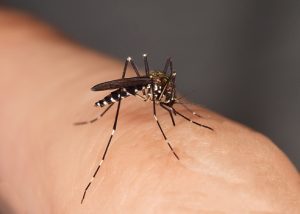 Just before Labor Day in 1999, Northern Queens became the epicenter of a very serious, and in rare cases, deadly disease – the West Nile Virus.
Just before Labor Day in 1999, Northern Queens became the epicenter of a very serious, and in rare cases, deadly disease – the West Nile Virus.
The West Niles Virus is primarily spread through the bite of a mosquito. While the overwhelming majority of those infected with the virus suffer either no or very minor symptoms, people over age 60, or those with a comprised immune system may be at risk of developing serious symptoms. In rare cases (less than 1%), individuals may develop headache, fever, stiff neck, nausea, vomiting, confusion, muscle weakness, or swelling of the brain (encephalitis) or paralysis. West Nile can even cause permanent neurological damage and death.
The disease was found only in Africa, the Middle East and parts of Asia. It had never seen in the United States, however, in the summer of 1999, Flushing Hospital doctors noticed a cluster of patients experiencing very mysterious symptoms that could not be explained. The medical staff immediately reached out to their partners at the local health authorities to report their findings. Together, the team identified the virus and alerted the public. The City’s response was immediate as they instituted an aerial assault days before the Labor Day weekend to eradicate the source…the mosquitoes. Thanks to the efforts of Flushing Hospital, many New Yorkers who might have otherwise been exposed while enjoying time outdoors were spared from becoming infected.
As we near the anniversary of this event, Flushing Hospital wants to continue to educate the public on how to stay safe and avoid becoming infected by West Nile or any other mosquito-borne diseases by following these tips to reduce your chances of exposure:
- Wear protective clothing such as long pants and long sleeved shirts, particularly between dusk and dawn when mosquitoes are most active
- Avoid shaded, bushy areas where mosquitoes like to rest
- Remove any places where standing water can collect on your property, such as tires, cans, plastic containers or pots,
- Make sure your roof gutters drain properly. Clean clogged gutters in the spring and the fall.
- Clean and chlorinate your swimming pools, outdoor saunas or hot tubs and drain water from pool covers
- Change the water in your bird baths at least every three to four days.
Flushing Hospital urges everyone to take proper precautions and enjoy the remainder of your summer.
All content of this newsletter is intended for general information purposes only and is not intended or implied to be a substitute for professional medical advice, diagnosis or treatment. Please consult a medical professional before adopting any of the suggestions on this page. You must never disregard professional medical advice or delay seeking medical treatment based upon any content of this newsletter. PROMPTLY CONSULT YOUR PHYSICIAN OR CALL 911 IF YOU BELIEVE YOU HAVE A MEDICAL EMERGENCY.
